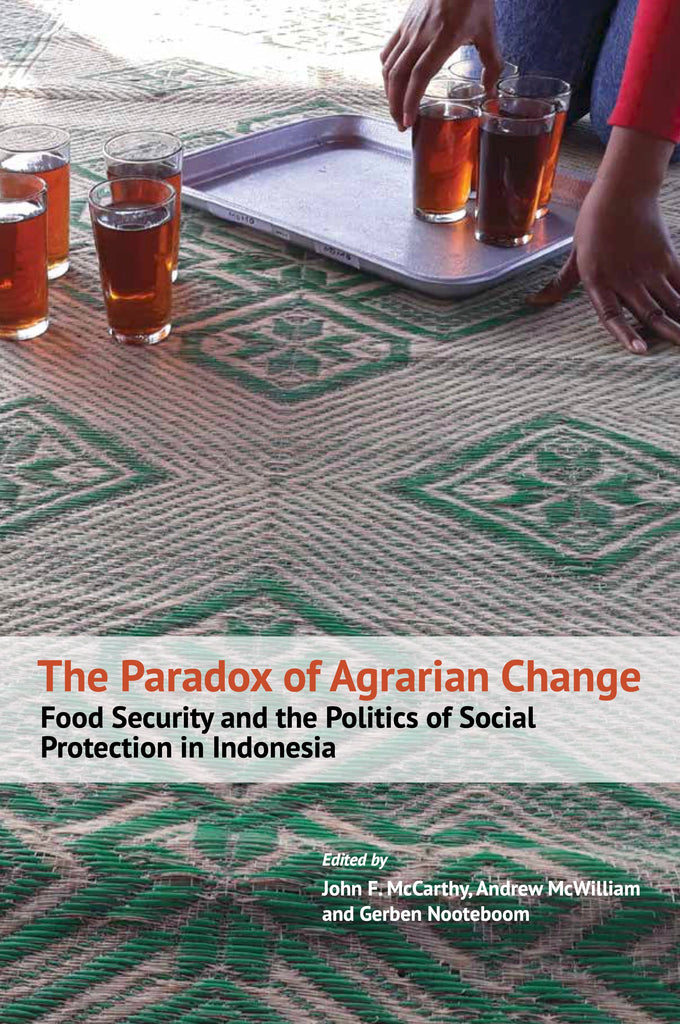The Paradox of Agrarian Change: Food Security and the Politics of Social Protection in Indonesia
$42.00 SGD
Edited by John F. McCarthy, Andrew McWilliam and Gerben Nooteboom
With contributions from Shaummil Hadi, Katiman, Pande Made Kutanegara, Stepanus Makambombu, Nulwita Maliata, Michelle Pols, Henri Sitorus, Mulyadi Sumarto, Naimah Talib, Jacqueline Vel, Carol Warren, Nur Isiyana Wianti, Lisa Woodward, Yani Taufik, Rudy Purba, Vania Budianto, and Yunita Winarto.
Economic growth in the middle-income countries of Southeast Asia over the last few decades is rightly hailed for reducing poverty. Indonesia is a prime example. But while poverty has declined in Indonesia, one of its worst impacts—nutritional insecurity—remains high, particularly in rural areas. Patterns of food poverty persist across Indonesia, despite a fall in poverty rates. What explains this troubling paradox? How does it relate to Indonesia’s enthusiastic embrace of the “entitlements revolution”, the use of direct cash transfers to reduce poverty and build social inclusion? This book analyses the nature and social consequences of economic development and agrarian change processes in rural Indonesia in relation to the scope and effectiveness of Indonesia’s social protection programmes.
The findings are based on extensive “ground-up” case studies in Indonesian communities in diverse eco-agrarian settings, seeking to understand the drivers of insecurity and vulnerability at a household level. The results show that while high-value farming, diversification and migration may offer a means of economic progress for poor households, economic growth also creates the conditions for increasing inequality, nutritional insecurity and ecological decline. This is due to the way class, gender and power work in remote local contexts, and the fact that much surplus income is used for enhanced consumption and changing lifestyles. To understand why nutritional insecurity and stunting patterns persist, we need to appreciate how rural change occurs. In many cases there are few signs of the classical structural transformation of the countryside which is considered the most decisive pathway out of rural poverty. While existing social assistance approaches soften the experience of poverty, they generate mistargeting problems, produce new patterns of inclusion and exclusion and provoke a contentious politics of distribution. New strategies are required to address food poverty and nutritional insecurity and provide fairer and socially acceptable ways of assisting the poor. The richly detailed findings in this study provide a novel multidimensional vision of processes of agrarian change. Its findings are of crucial importance to Indonesian policymakers, but will also be of relevance to scholars and practitioners of rural development in other middle-income countries seeking to address nutritional insecurity and livelihood vulnerability.
"Contemporary rural development throwing up complex social landscapes of winners and losers. The originality of this book is that it builds an overarching explanation of why this occurs using rich multi-site evidence from rural Indonesia. It is an extraordinary research effort which should be read widely."
– Bill Pritchard, University of Sydney
"It is an ethnographically rich book with a wide variety of case studies in Indonesia presented through the newly proposed approach of agrarian scenario change. The book exquisitely analyses why so many people from rural Indonesia are still vulnerable to nutritional insecurity whilst poverty rates are declining simultaneously. The book is a valuable addition to the existing literature and an interesting read for everyone working in agriculture, agrarian change and food security."
- Jop Koopman, The Journal of Peasant Studies vol. 51 issue 1
John F. McCarthy is an associate professor in the Crawford School of Public Policy at the Australian National University, Canberra, Australia.
Andrew McWilliam is professor of Anthropology in the School of Social Science, Western Sydney University, Sydney, Australia.
Gerben Nooteboom is associate professor at the Department of Anthropology, University of Amsterdam (UvA), The Netherlands.
Publication Year: 2022
472pp || 229 x 152mm
10 maps, 37 figures, 14 b/w images, 32 tables
Paperback
ISBN: 978-981-325-183-0

